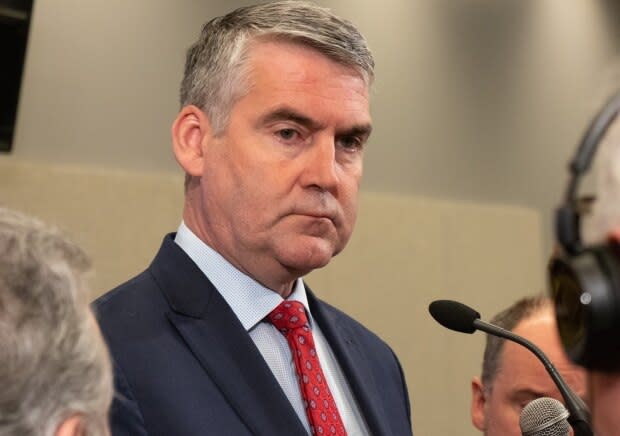N.S. premier calls doctor licensing rules 'disheartening'
Nova Scotia's premier says the colleges that regulate physicians need to modernize and be more flexible if they want to make patient care a priority and keep more doctors in the province.
Stephen McNeil made the comments after reading a CBC News report about Dr. Ajiri Ikede.
The physician, who is from Prince Edward Island and currently works in Ontario, is giving up his licence to work in Nova Scotia. He's frustrated by the way the College of Physicians and Surgeons issues a late fee before a medical licence expires.
He pointed out that Nova Scotia's college is just one of two in Canada that charges fees this way, and it collected nearly $50,000 dollars because of the rule. This year, about 100 physicians incurred the $487 fine.
McNeil says that is just one more example of why the college needs to be flexible.
"The public out there would believe its government is the roadblock here," he said. "It's not government. This is the College of Physicians that needs to make it easy for anyone who has been registered in Nova Scotia to stay registered."
While the college did not respond for a followup request for comment, it told CBC previously that the late fees are important to ensure no licences expire.
It had repeatedly reached out to Ikede to remind him that a deadline was approaching.
If a licence expires, the doctors cannot work. The college pointed out that patients would have been affected.
But McNeil says the college needs to take down barriers that push competent doctors away.
"It's disheartening and it's exactly the challenge that we, as a government, are facing," McNeil said of Ikede's frustrations.
"I think we all, including the college, should stay focused on this is about access to primary care."
Each college is independent and McNeil has no power to order changes.
He has, however, long advocated for a national college, with the same fees and rules for every province. He suggests provincial chapters could continue to address complaints and monitor physicians.
"In my view, if everyone truly comes together, it doesn't need to take five years."
Under the current system, physicians have to have their credentials checked and pay for licences in every province where they want to work. The cost of the licence varies dramatically.
New Brunswick, for example, charges $600 year. Nova Scotia charges $1,950.
"I think the colleges have to explain to their members why one is charging that fee and, in another province, they're charging much less," he said.
McNeil believes Nova Scotia's physician shortages could be eased if more physicians from outside the province had the ability do locum work, which is essentially being a substitute.
"What I would argue – and I share the frustration that you hear in the public – is that I don't believe these organizations have modernized themselves to the mobility of its own client," he said.
While a national registry is his ultimate goal, McNeil has spent the last few years pushing for the creation of an Atlantic agreement. It would allow physicians to share a registry in the Atlantic provinces.
"There's ongoing conversations about it. And my understanding is that there's been progress made on at this point. But we're still a ways away from any kind of announcement around that."
Doctors Nova Scotia is also on board with McNeil's efforts for an Atlantic, or even national licence.

"This was on our agenda," said Nancy MacCready-Williams, the organization's CEO. "This is part of the administrative burden. If they want to practise in any of our neighbouring provinces, they have to go through that licensing process, which we know is a fairly comprehensive process."
She said she hasn't heard any pushback from the colleges on the proposal.
"I do know that the colleges are working on this. We're hopeful this will come to pass."
She has also heard complaints behind the scenes about late fees, but she directs those complaints to the Nova Scotia college.
MORE TOP STORIES

